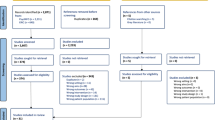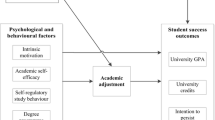Abstract
The purpose of this study, which was conducted over the course of five semesters at one institution, was to determine the effectiveness of the Academic Coaching for Excellence (ACE) program for academically at-risk students. The study utilized archival data, which had been collected by the Center for Academic Retention and Enrichment Services (CARES), for 1434 undergraduate students in a cohort-based, nonequivalent groups post-tests design. Results indicated that full- and part-time students who participated in academic coaching had significant GPA increases, were more likely to earn at least a 2.00 GPA in the intervention semester, and were more likely to be retained at the university the following semester than were those students who did not participate in the program. Implications for higher education professionals are discussed.
Similar content being viewed by others
References
Academic coaching for excellence quality enhancement plan (n.d.). Retrieved from University of Memphis website: https://www.memphis.edu/academiccoaching/academic_coaching/index.php
Atherton, M. C. (2014). Academic preparedness of first-generation college students: Different perspectives. Journal of College Student Development, 55, 824–829. https://doi.org/10.1353/csd.2014.0081
Bellman, S., Burgstahler, S., & Hinke, P. (2015). Academic coaching: Outcomes from a pilot group of postsecondary STEM students with disabilities. Journal of Postsecondary Education and Disability, 28, 103–108.
Bettinger, E., & Baker, R. (2011). The effects of student coaching in college: An evaluation of a randomized experiment in student mentoring. (NBER Working Paper No. 16881). Cambridge, MA: National Bureau of Economic Research. https://doi.org/10.3386/w16881
Capstick, M. K. (2018). Exploring the effectiveness of academic coaching for academically at-risk college students (Unpublished doctoral dissertation, The University of Memphis).
Carnevale, A. P., Smith, N., Melton, M., & Price, E. W. (2015). Learning while earning: The new normal. Retrieved from Georgetown University Center on Education and the Workforce website: https://cew.georgetown.edu/wp-content/uploads/Working-Learners-Report.pdf
Cataldi, E. F., Bennett, C. T., & Chen, X. (2018). First-generation students: College success, persistence, and postbachelor's outcomes (NCES 2018–421). Retrieved from National Center for Education Statistics website: http://nces.ed.gov/pubsearch
Center for Academic Retention and Enrichment Services (n.d.). Academic warning. Retrieved from University of Memphis website: http://www.memphis.edu/cares/academicwarning.php
Chen, X. (2016). Remedial coursetaking at U.S. public 2- and 4-year institutions: Scope, experiences, and outcomes (NCES 2016–405). Retrieved from National Center for Education Statistics website: http://nces.ed.gov/pubsearch
Cholewa, B., & Ramaswami, S. (2015). The effects of counseling on the retention and academic performance of underprepared freshmen. Journal of College Student Retention: Research, Theory and Practice, 17, 204–225. https://doi.org/10.1177/1521025115578233
Chung, E., Turnbull, D., & Chur-Hansen, A. (2017). Differences in resilience between “traditional” and “non-traditional” university students. Active Learning in Higher Education, 18, 77–87. https://doi.org/10.1177/1469787417693493
Crisp, G., Baker, V. L., Griffin, K. A., Lunsford, L. G., & Pifer, M. J. (2017). Mentoring undergraduate students. ASHE Higher Education Report, 43, 7–103. https://doi.org/10.1002/aehe.20117
DeNicco, J., Harrington, P., & Fogg, N. (2015). Factors of one-year college retention in a public state college system. Research in Higher Education Journal, 27, 1–13.
Department of Veteran Affairs (2014). Characteristics of student veterans. Retrieved from https://www.mentalhealth.va.gov/studentveteran/docs/ed_todaysStudentVets.html
Engle, J., & Tinto, V. (2008). Moving beyond access: College success for low-income, first- generation students. Retrieved from The Pell Institute for the Study of Opportunity in Higher Education website: https://files.eric.ed.gov/fulltext/ED504448.pdf
Field, S., Parker, D., Sawilowsky S., & Rolands, L. (2010). Quantifying the effectiveness of coaching for college students with attention deficit/ hyperactivity disorder (final report to the Edge Foundation). Retrieved from Edge Foundation website: https://edgefoundation.org/wp-content/uploads/2011/03/Edge-Report-11-10a-exec-summary.pdf
Flynn, E. E. (2015). It’s all about saving face: Working with the urban college student. College Student Journal, 49, 187–194.
Franklin, J., & Franklin, A. (2012). The long-term independently assessed benefits of coaching: A controlled 18-month follow-up study of two methods. International Coaching Psychology Review, 7, 33–38.
Friedman, J. (2017, April 4) U.S. News data: The average online bachelor’s student. Retrieved from https://www.usnews.com/higher-education/online-education/articles/2017-04-04/us-news-data-the-average-online-bachelors-student
Friedman, J. (2018, January 11) Study: More students are enrolling in online courses. Retrieved from https://www.usnews.com/higher- education/online-education/articles/2018-01-11/study-more-students-are-enrolling-in-online-courses
Goldrick-Rab, S., & Pheffer, F. (2009). Beyond access: Explaining socioeconomic differences in college transfer. Sociology of Education, 82, 101–125.
Gow, K., McKenzie, K., & Schweitzer, R. (2004). Exploring first-year academic achievement through structural equation modelling. Higher Education Research and Development, 23, 95–112.
Hoops, L. D., & Artrip, A. (2016). College student success course takers’ perceptions of college student effectiveness. Learning Assistance Review, 21, 55–67.
Lee, H., Flores, L. Y., Navarro, R. L., & Kanagui-Muñoz, M. (2015). A longitudinal test of social cognitive career theory's academic persistence model among Latino/a and white men and women engineering students. Journal of Vocational Behavior, 88, 95–103. https://doi.org/10.1016/j.jvb.2015.02.003
Mitchell, J. J., & Gansemer-Topf, A. M. (2016). Academic coaching and self-regulation: Promoting the success of students with disabilities. Journal of Postsecondary Education and Disability, 29, 249–256.
National Academic Advising Association (2017). Academic Coaching Advising Community. Retrieved from https://www.nacada.ksu.edu/Community/Advising-Communities/Academic-Coaching.aspx
National Conference of State Legislature (2015). Performance-based funding for higher education. Retrieved from www.ncsl.org/research/education/performance-funding.aspx
Niu, S. N. (2015). Leaving home state for college: Differences by race/ethnicity and parental education. Research in Higher Education, 56, 325–359. https://doi.org/10.1007/s11162-014-9350-y
Office of Institutional Research (n.d.). Enrollment monitor for fall 2017. Retrieved from The University of Memphis website: http://www.memphis.edu/oir
Ordway, D. M. (2015, July 15). Performance funding for colleges: Research roundup. Retrieved from https://journalistsresource.org/studies/society/education/performance-funding-colleges-research-roundup
Perez, E. (2014). Exploring student perceptions of academic mentoring and coaching experiences. Retrieved from ERIC database. (ED557015).
Postsecondary National Policy Institute (2018). Factsheets: First-Generation students. Retrieved from https://pnpi.org/factsheets/first-generation-students/
Rabourn, K. E., Shoup, R., & BrckaLorenz, A. (2015, May). Barriers in returning to learning engagement and support of adult learners. Paper presented at the annual forum of the Association for Institutional Research, Denver, CO. Retrieved from http://nsse.indiana.edu/pdf/presentations/2015/AIR_2015_Rabourn_et_al_paper.pdf
Robinson, C., & Gahagan, J. (2010). In practice: Coaching students to academic success and engagement on campus. About Campus, 15(4), 26–29. https://doi.org/10.1002/abc.20032
Robinson, C. E. (2015). Academic/success coaching: A description of an emerging field in higher education. (Doctoral dissertation, University of South Carolina - Columbia). Retrieved from http://scholarcommons.sc.edu/etd/3148
Sandoz, E. K., Kellum, K. K., & Wilson, K. G. (2017). Feasibility and preliminary effectiveness of acceptance and commitment training for academic success of at-risk college students from low income families. Journal of Contextual Behavioral Science, 6, 71–79. https://doi.org/10.1016/j.jcbs.2017.01.001
Sanford, T., & Hunter, J. (2011). Impact of performance funding on retention and graduation rates. Education Policy Analysis Archives, 19, 1–30. https://doi.org/10.14507/epaa.v19n33.2011
Shapiro, D., Dundar, A., Wakhungu, P. K., Yuan, X., Nathan, A., & Hwang, Y. (2016). Time to degree: A national view of the time enrolled and elapsed for associate and bachelor’s degree earners (Signature Report No. 11). Retrieved from National Student Clearing House Research Center website: https://nscresearchcenter.org/signaturereport11/
Sirin, S. R. (2005). Socioeconomic status and academic achievement: A meta-analytic review of research. Review of Educational Research, 75, 417–453.
Smith, B. (2009). Mentoring programs: The great hope or great hype? (ASHE/Lumina Policy briefs and critical essays, No. 7). Ames, IA: Iowa State University, Department of Educational Leadership and Policy Studies.
Stewart, S., Lim, D. H., & Kim, J. (2015). Factors influencing college persistence for first-time students. Journal of Developmental Education, 38(3), 12–16.
Strand, K. J. (2013). Making sure they make it! Best practices for ensuring the academic success of first-generation college students. Retrieved from ERIC database. (ED561082).
Tate, E. (2017, April 26). Graduation rates and race . Retrieved from https://www.insidehighered.com/news/2017/04/26/college-completion-rates-vary-race-and-ethnicity-report-finds
Tennessee Higher Education Commission (2015). Postsecondary attainment in the decade of decision: The master plan for Tennessee postsecondary education 2015–2025. Retrieved from https://www.tn.gov/content/dam/tn/thec/bureau/research/other-research/master-plan/MasterPlanSummary.pdf
Tinto, V. (1993). Leaving college: Rethinking the causes and cures of student attrition (2nd. ed.). Chicago, IL: The University of Chicago Press.
Trenz, R. C., Ecklund-Flores, L., & Rapoza, K. (2015). A comparison of mental health and alcohol use between traditional and nontraditional students. Journal of American College Health, 63, 584–588. https://doi.org/10.1080/07448481.2015.1040409
U.S. Census Bureau (n.d.) QuickFacts. Retrieved from https://www.census.gov/quickfacts/memphiscitytennessee
Westrick, P. A., Le, H., Robbins, S. B., Radunzel, J. M., & Schmidt, F. L. (2015). College performance and retention: A meta-analysis of the predictive validities of ACT® scores, high school grades, and SES. Educational Assessment, 20, 23–45.
Author information
Authors and Affiliations
Corresponding author
Additional information
Publisher’s Note
Springer Nature remains neutral with regard to jurisdictional claims in published maps and institutional affiliations.
Rights and permissions
About this article
Cite this article
Capstick, M.K., Harrell-Williams, L.M., Cockrum, C.D. et al. Exploring the Effectiveness of Academic Coaching for Academically At-Risk College Students. Innov High Educ 44, 219–231 (2019). https://doi.org/10.1007/s10755-019-9459-1
Published:
Issue Date:
DOI: https://doi.org/10.1007/s10755-019-9459-1




